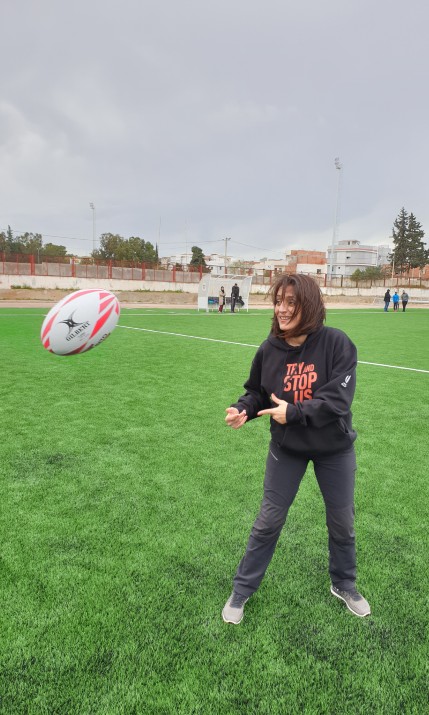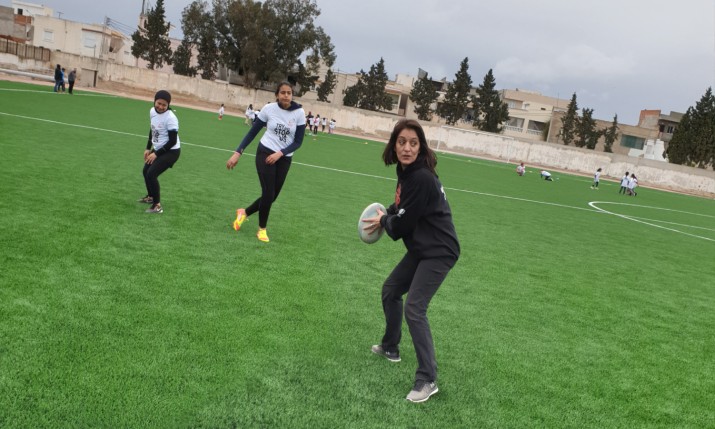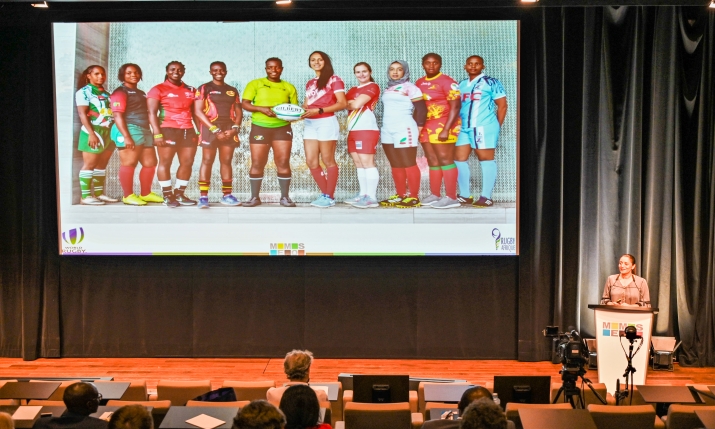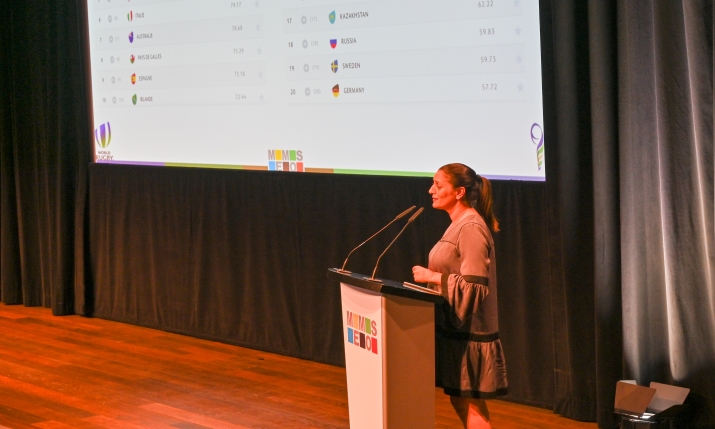Maha Zaoui: From teacher to women’s head of Rugby Africa
How one woman is changing the perception of women’s rugby in Africa

Dr. Maha Zaoui, Women’s Rugby manager at Rugby Africa, is revolutionising the women’s game across the continent
Rugby Africa has a new Women’s Rugby manager, Tunisia-born Dr. Maha Zaoui. Since she first discovered the game in 2005, her passion for the sport alongside her successful career, which has seen her work on multiple sports organising committees, has propelled her and now the sport itself forward.
Zaoui has made it her mission to grow female participation in women’s rugby across Africa. In 2018, she was an inaugural recipient of the World Rugby Women’s Executive Leadership Scholarship to enhance women’s rugby in Africa. Two years later, her appointment at Rugby Africa enables her to continue the work she has been doing within the Fédération Tunisienne de Rugby (FTR), but on a bigger scale.
Women’s rugby has already been introduced to 39 unions affiliated with Rugby Africa throughout the continent. Zaoui has worked at the FTR for many years alongside Khaled Babbou, the President of Rugby Africa who is keen to promote women’s rugby during his tenure. Pushing the growth of women’s rugby has been a Tunisian priority, and Babbou has previously lauded the country’s qualification for the 2018 Youth Olympic Games in Argentina.
“In Tunisia, we realised that if we had a chance to shine in rugby, it was with the women,” recalls Zaoui. “We have tried with men at sevens; we have put [in] a lot of money but it did not work. Then we realised that if we invest in the girls, we could do it.”
Rugby Africa, meanwhile, took the decision in October to award Tunisia the rights to host the continental women’s sevens tournament for the next two years.
Changing perceptions with #EachForEqual
Since the integration of rugby sevens into the Olympic Games programme, Zaoui says the perception of women’s rugby has changed and the sport has lost its label as an aggressive sport and became an athletic sport; a spectacle that viewers can enjoy.
She comments: “Being broadcast and having a platform creates visibility and fans. On International Women’s Day 2020, Rugby Africa announced that the flagship 15’s competition, the Rugby Africa Cup 2020, has now become one for the female and male edition. The women’s games will be played as curtain raisers of the men’s matches as often as possible.”
This is in line with the Rugby Africa #EachForEqual campaign, which aims to increase gender equality in all areas of the sport.
On how this merger of the men’s and women’s games at events will help, Zaoui says: “There are a couple of aspects, but one is to create appetite and to get more fans into the stadium to watch the women’s games and in terms of broadcasting, it becomes more cost effective to broadcast two matches for pretty much the price of one. So Rugby Africa is also trying to force more opportunities for the women’s matches to be broadcast and viewed.”
She continues: “One of our priorities is working with the unions on how to attract broadcasters, because this is one of the ways we can attract more fans and more advertisers, while we ensure a good quality transmission of the game.”
Advocating a broadcasting boost
As to how broadcasting the women’s game throughout Africa and beyond will benefit her mission, Zaoui says: “Now, with the different communication channels and especially social media, there are more possibilities to spread the image of women’s rugby. On the one hand broadcasting has become easier to do and we can also reach a larger number of people. On the other hand, we are competing with more offerings and have to create an attractive product with modern tournaments and formats that speak to existing and future fans.
“The broadcasting quality and the image we transmit are key,” she continues. “For the Rugby Africa Cup 2020 elimination stage we have experimented with a new concept and state-of-the-art broadcasting concept. We haven’t actively communicated around this, but from what we know, it was the first time ever a REMI-production was used in Africa where we transmitted the games to a central commentator and broadcasting studio from the pitches all across Africa.”
Her colleague, Andrew Owor, vice president of Rugby Africa, has been and is very involved in this development, which included a free live stream available on the Rugby Africa Facebook page and Youtube channel. It included replays, highlights and high level commentaries, the first results which for the RAC 2020 saw record-breaking reach and engagement rates on Rugby Africa’s social media platforms; Facebook was used as the primary driver and showed a 68% increase in reach and 95% increase in page likes, when compared to previous periods. The spin-off content from the matches was organically picked up and shared on multiple pages allowing for great global awareness.
“If we link our efforts, we can achieve a lot,” notes Zaoui.

Out on the field with young female rugby players in Tunisia, Dr. Maha Zaoui, Women’s Rugby manager at Rugby Africa
Going OTT with women’s rugby
On the role of over the top (OTT) broadcasting of the women’s game as part of this growth, Zaoui says: “Today, the observation is clear; the consumption of audio visual content in OTT, directly from a browser or an application, is now part of daily use. According to a 2018 study by Performance Communications, more than 50% of sports fans watch their sports online via streaming. In addition, the new generation of sport spectators were born in the digital age and the internet has enabled them to explore all sports.
“Broadcasting women’s rugby is still a real challenge, whether on a national African or global level, but we are working on synergy effects to create equally attractive broadcasting formats and products,” she continues. “The traditional sport business model is gradually shifting from linear television to digital via the OTT model. The objective of Rugby Africa is to put into place a digital communication strategy by using those new models and of course by creating new formats of high performance sports for women alongside.”
As to how she sees sports broadcasting – linear and OTT – helping to drive audiences to watch women’s matches in person, on TV, and to take part, Zaoui says: “The media coverage of women’s sport has increased significantly in recent years. Women’s football is a good example. TF1 had acquired all the broadcasting rights for the 2019 edition of the Women’s World Cup. The media coverage of women’s rugby is also progressing.
“During the 2017 World Cup, we saw the first broadcast of a women’s rugby match on France 2. This match gathered an average of 2.3 million viewers with a peak of audience of 3.1 million at the end of the match. Even if this diffusion remains exceptional, we can see that broadcasting is the best way to drive audiences to watch women’s matches on TV, and since they can see that it’s not a man-only sport, that we can enjoy a good show and that we can watch a good game, the next step is to watch it live on site and why not try it or bring your friend, sister or daughter.”
Taking a global lead
On the need to push women’s rugby in Africa, she states it is more about taking the lead globally: “Male dominated is a qualification that can be applied to many sports, so the goal to push the women’s game forward is not something specific to rugby nor Africa. On the contrary, we can take real leadership here and Rugby Africa is committed to accelerating the development of women in rugby in Africa.
“Women within Rugby Africa are present and very active as Rugby Africa has showcased in a campaign on social media leading up to International Women’s Day 2020, where we celebrated women’s achievements in rugby on all levels,” she says. “My goal is to assist these women to enhance their actions.”
Initially Zaoui is carrying out an analysis of women within Rugby Africa, from athletes, physical trainers, doctors and physiotherapists, to referees, and also of the female leaders in the sport, from members of the union’s board or clubs, to team managers.
She adds: “This analysis will help to identify current issues, create a targeted strategy and develop solutions that will ultimately lift the development of women off the ground. This includes the overall women’s sport participation, female inclusion and representation in governing and management roles, match officials, trainer, teacher, staff, etc, and of course the development of the high performance sport.”
The goals of Rugby Africa align with Zaoui’s executive master’s degree focus in management of sports organisations, which was about a development strategy for women’s rugby. Among her aims now are to train coaches, match officers and medical staff to anticipate the increase in the number of players, organise ambitious and inspiring national and international competitions by offering beautiful broadcasts, initiate and support national competitions targeting the under 16’s, include a minimum of two women on the board of directors, and develop a new broadcasting market by increasing the visibility of women in rugby on all digital communication platforms.

Dr. Maha Zaoui, Women’s Rugby manager at Rugby Africa, on stage
Career progression
Zaoui herself started out as a sports teacher in Tunisia. After her high school days, where she swam competitively for 14 years, were over, Zaoui got a level three diploma as a swimming coach at the Sports and Physical Education Institute, Ksar Saïd, Tunisia, which took her to her first role as a high school sports teacher in 1995.
She explains what came next: “In 1997, I joined the organising committee of the Mediterranean Games as vice president of the technical commission. It was an opportunity to work with the 23 Olympic committees which participated at the games and with the 23 international sport federations which were part of the program of the games,” she says.
Between 1997 and 2005, Zaoui became an international swimming referee, got her Masters degree, and after the Mediterranean Games was asked to work on several organising committees including that for the African Athletics Championship in 2002 and the Men’s Handball World Championship in 2005.
Then in 2005 Zaoui was asked to join the board of the Tunisian Rugby Federation, the FTR, to be responsible for women’s rugby. She comments: “I was surprised by this proposal, but at the same time, I said why not? It was a great discovery for me. As a sport’s teacher, it was not very difficult for me to set up a very efficient female team and manage it. And since that date I have never left the rugby family, even though I had additional roles at the board of the Athletics Federation Tunisia where I was responsible of the marketing commission (2009-2013), and then elected as a member of the Executive Board of the Tunisian National Olympic Committee (CNOT).” She adds: “I was also director of the National Olympic Academy in Tunisia from 2013 to 2016.”
In 2017 the FTR asked Zaoui to take the role of head of women’s rugby. “In the same year, I was appointed as director of Rugby Africa Women’s Sevens,” she explains. “In 2018 I was selected for the first edition of the World Rugby Leadership Development Scholarship and chose to do the Master Executive of Management of Sport’s Organisations (MEMOS) exam run by the International Olympic Committee. It includes management in human resources, finances, strategy, governance, sponsorship. “After a year of study ending in July 2019, I defended my thesis, ‘Development strategy for women’s rugby in Africa. 2019-2025’, and my PhD thesis which deals with performance of sport’s organisations.”
Foundations had been laid. “Then, I proposed to Rugby Africa a project to develop women’s rugby all around the continent both on and off the field, including administration, leadership, training, education. All of this helped me to be the successful applicant.”
Her role has been specially created, as the development of the women game is one of the key priorities of Rugby Africa. Zaoui says: “I am proud to be a pioneer by taking this new role. I am looking forward to developing and implementing Rugby Africa’s strategic plan around women’s rugby, which includes the engagement of all stakeholders, affiliated bodies, partners and all other departments.
“An important aspect is here the management of a career pathway for all women in rugby and to ensure that an integrated development structure of women’s rugby is developed and implemented,” she continues. “I have been doing all this for many years on a national level; now it’s a continental challenge and I am looking forward to drive the development of women’s rugby to the next level on a larger scale.”
 Growing the game
Growing the game
Following the broad outlines of her thesis, Zaoui does not hesitate to predict success over the next four years, even if her goal looks extremely ambitious. “For me, the ideal scheme in women’s rugby during the next four years would be to have an African U16 and U18 championship, an innovative African Rugby Sevens Series (not just a tournament once a year), a continental 15s championship (connecting the four corners of Africa), a proper women’s rugby commission in Africa in terms of governance and administration (which would mean having one women’s rugby manager in each union) and a national women’s championship in each union affiliated with Rugby Africa,” Zaoui explains.
She adds: “It will be possible in four years! It already exists here and there, but we need to coordinate and work together. The icing on the cake would be to have two women’s teams qualified for the Olympic Games, if possible for Paris 2024.”
Concluding, Zaoui states: “If we want to be a modern sport, women’s rugby must have an equal role. We are ready to build the infrastructure that is needed and are aware that we will have to undertake many more steps in order to reach our goal.”
